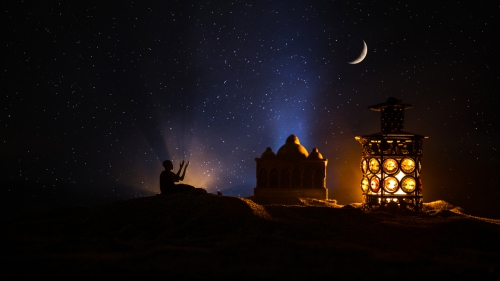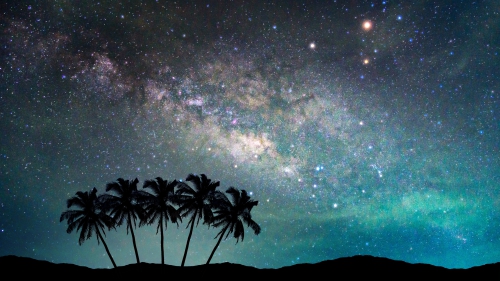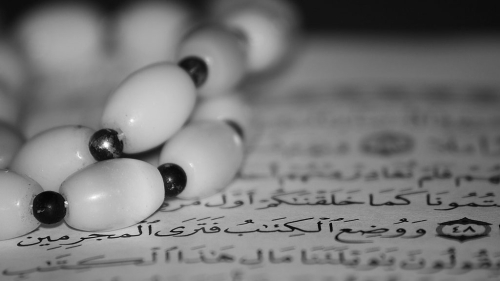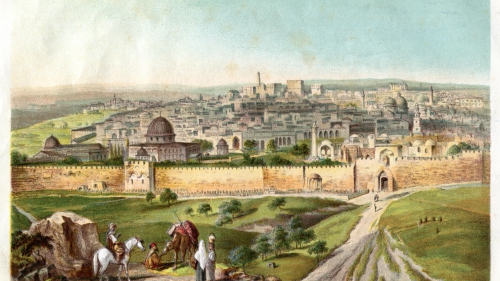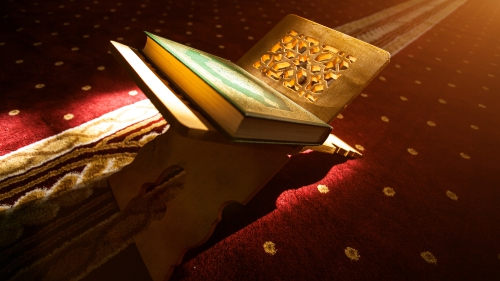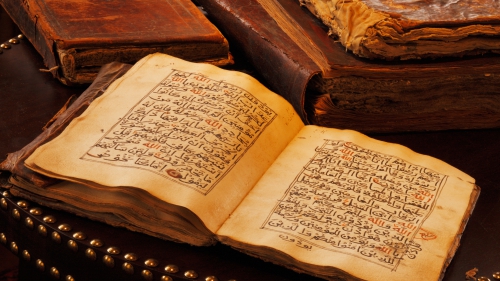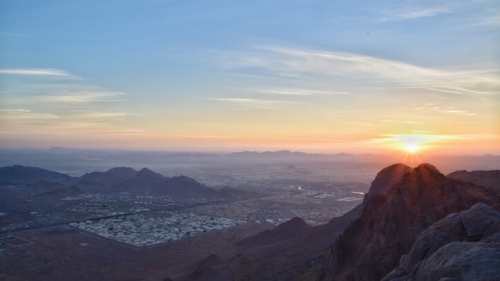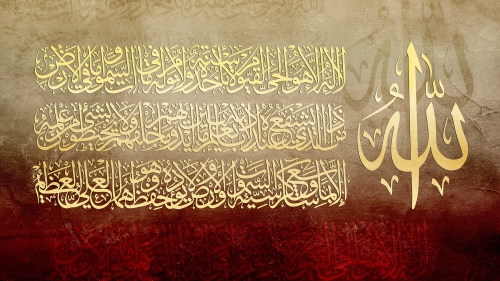The oldest surviving fragment of the Quran: 'All Muslims would love to see it'

Radiocarbon testing at Oxford University dated the parchment to the time of the prophet, who is generally believed to have lived between 570 and 632. Frank Augstein / AP Photo
Bought 90-odd years ago, bound with other manuscripts, left forgotten in an archive . . . and now revealed to date to the time of the Prophet. The story of the Mingana Quran is as amazing as it is significant for the early history of Islam.
The unveiling on Wednesday of what may be the oldest surviving fragment of the Quran, quite possibly dating from the time of the Prophet Mohammed himself, has triggered a debate about its significance that will doubtless occupy scholars for years to come.
But the true meaning of the priceless manuscript, discovered in a university library in the UK's most culturally diverse city, can clearly be seen in the eyes of Muhammad Afzal, a councilor and chairman of Birmingham's Central Mosque, who is among the few to have seen it in person.
"I'm honored to see this manuscript," he said in a short film released by Birmingham University, whose academics identified and authenticated the two precious pieces of parchment, probably made from the skin of a sheep or a goat.
"All the Muslims in the world would love to see this manuscript."
The story of how it came to be in Birmingham, and how it was in effect "lost" for almost sa century, is an inspirational one.
Between 1925 and 1929, Alphonse Mingana, a Chaldean theologian and historian born in 1878 in a Christian village near Mosul in present-day Iraq, made three trips to the Middle East from Birmingham, which was his home from 1913. The trips were funded by Edward Cadbury, the heir to the British chocolate company and philanthropist, and Mingana returned with more than 3,000 manuscripts in 11 languages, dating from the 6th to the 20th centuries.
At least one, however, he is believed to have bought in about 1930 from a dealer in Leiden in the Netherlands.
It was an 18-page fragment of an early Quran. Catalogued by Mingana as manuscript 1572, his handwriting can be seen in a margin of the document - a practice that would be unheard of now. It is now as part of the Mingana Collection, held in Birmingham university's Cadbury Research Library.
Written in Kufic script, it was thought to date from the late seventh century, but it wasn't until some time in the 1990s that a visiting scholar saw that two of the pages were different.
"What seems to have happened is that some time maybe in the middle of the last century these two leaves were bound together with the leaves from another copy of the Quran and nobody noticed that stylistically they were different," says David Thomas, professor of Christianity and Islam at Birmingham university.
The visiting scholar noted the discrepancy - the two pages, beautifully penned and with the ink still vividly readable, were written in Hijazi script, unlike the rest of the document, which was in Kufic - and moved on, leaving the clue hanging tantalizingly in the records.
It was two decades later that Alba Fedeli, an Islamic studies specialist from Italy, picked up the trail and came to Birmingham University to devote her PhD to unravelling the secret.
When her PhD is published shortly, her findings will be devoured by Islamic scholars.
The key to authenticating the period of the manuscript was radiocarbon dating, a destructive process always sensitive when dealing with historic documents and especially so when it comes to copies of the Quran.
"Very sensitive indeed," says Prof Thomas, "and a lot of thinking went into it beforehand. But there is a relatively wide margin around the actual text and one little corner was more or less detached, so it was thought that could be separated from the rest."
Importantly, the tiny fragment contained no text at all, which means that whereas the parchment itself has been dated, the ink has not. The university is now investigating the possibility of non-destructively testing the ink but, says Prof Thomas, "our supposition is that the animal skins will have been prepared for the purpose of writing on them, and therefore that the writing must date to a very close time after the dating of the skins".
And therein lies the astonishing nature of this find. Radiocarbon analysis carried out at Oxford University, accurate to within 95.4 per cent, has dated the parchment to between AD 568 and 645.
As the Prophet Mohammed lived from AD 570 to 632, this means that at the very latest the fragment was produced no more than 13 years after his death.
The "startling" ramification of this, says Nadir Dinshaw, professor of inter-religious relations at Birmingham, is that this Quran "could well take us back to within a few years of the actual founding of Islam. According to Muslim tradition, the Prophet Mohammed received the revelations that form the Quran between AD 610 and 632, the year of his death".
What that means, says Prof Thomas, is that the Mingana Quran is "a tangible, material link with events that are of almost literally world-shaking significance".
With academic caution, the university is referring to its treasure only as "one of the earliest Quranic manuscripts in the world", but this may be understating the case.
Previous contenders include the Uthman, or Samarkand Quran, also written in Kufic script and until 2014 considered the oldest example. Believed to have been compiled by the third caliph in 651, it has been radiocarbon-dated to between AD593 and 855.
In November last year, however, radiocarbon-dating revealed a Quran held at the University of Tübingen Library in Germany to be 100 years older than previously thought. Dated to AD 649-675 - from between 20 and 40 years after the Prophet's death - it now seems to be slightly younger than the Mingana Quran.
"We have now in our collection what must be one of the oldest Qurans in the world," says Prof Thomas. "It might not be the oldest. But if the dating we've been given is at all reliable then we've got fragments from a Quran that will have been copied by somebody who either knew the Prophet Mohammed himself, or knew somebody who had known him."
Equally important, he says, is that the fragments "support the view that the Quran was written down at an early stage in a form that is very close to the Quran as we have it now.
"There has been a debate for a long time among non-Islamic academics about the history of the Quran and whether it was complete by the time of the death of Mohammed or whether it continued to be added to and slightly changed to meet the community's needs for possibly up to 100 years after his death.
"But the fact that these two folios are, not identical, but very close to the Quran as it is now found in published form, would support the view that the Quran was collected together substantially in the form that we now recognize it."
The Mingana Quran, says Susan Worrall, director of special collections at the Cadbury Research Library, is "a great discovery for the university . . . a genuine treasure that is of global significance to Muslim heritage and the study of Islam, as well as being a source of great pride to the local community."
Soon, that community will get their chance to see the Mingana Quran up close - the manuscript will be on display at Birmingham University's Barber Institute of Fine Arts between October 2 and 25.
Fewer locations in Britain could be more appropriate for such an exhibition: there are more than 150 mosques in and around Birmingham and, according to the most recent census, over 21 per cent of the Midlands city's population of 1.1 million are Muslim.
In a twist of history unforeseeable at the time it first came to the city, a document associated with the earliest days of a religion that grew to embrace the entire world finds itself once again among the faithful.
Related Suggestions








